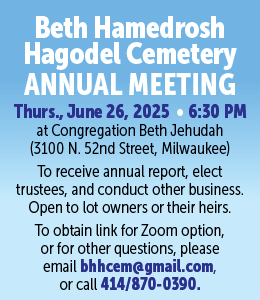We shared a bagel with Rabbi Francis Barry Silberg, teacher, scholar and television show host.
“The German Romantics had an expression, das Streben, the striving,” said Rabbi Francis Barry Silberg. “One is well advised to strive, to think, to create for as long as one lives.”
In the more than five years since he became rabbi emeritus of Congregation Emanu-El B’ne Jeshurun, Silberg has sought to continue striving, thinking and creating.
His most recent achievement has been to earn a second Ph.D. degree, this one from the University of Wisconsin-Milwaukee in “Multidisciplinary Studies: The History, Philosophy and Literary Analysis of Ideas.”
Silberg, 62, said he decided to pursue this goal partly out of a sense of balance. He already had pairs of bachelor’s and master’s degrees, one each in a secular and the other in a “sacral” subject. It remained only to match his “sacral” doctorate in philosophy with one on a secular subject.
His originally attempted to study and write about the concept of genius, but he became dissatisfied as a lot has been written about that topic and “I wanted to till new ground.”
So he decided to write instead about a specific genius, one he knew.
For the past six years he has sought out and studied the works of one of his former teachers, who today is “a respected and trusted friend, colleague and confidant” — Ellis Rivkin, professor emeritus of Jewish history at the Hebrew Union College-Jewish Institute of Religion, the U.S. Reform movement’s primary institution of higher education.
Silberg said that Rivkin “is the seminal Jewish historian of second half of the 20th century,” and he attempts to display why in his dissertation “Aspects of the Life and Work of Ellis Rivkin: An Intellectual Biography with Annotated Bibliography.”
In a short conversation, Silberg could only touch on some highlights of Rivkin’s contributions. As an economic historian, Rivkin coined the term “globalism” in 1967.
As historian of Judaism, Rivkin developed theories about the origin of the Torah that “clarify and replace” Julius Wellhausen’s “documentary hypothesis.” He also attempted to show through close reading of ancient sources, including the Christian scriptures, that the synagogue and the Pharisees did not appear as early in Jewish history as many others have believed.
There’s a lot more. Indeed, Silberg said that he read “everything [Rivkin] wrote,” including many manuscripts that remain unpublished. In fact, part of Silberg’s task for the dissertation was to “find everything he wrote” from the 1940s on, requiring trips to many libraries.
But this hasn’t been Silberg’s only project by any means. He continues teaching his “Jewish Religious Thought” class at Marquette University and is still scholar-in-residence in ethics at the UWM business school.
His television show, which has been broadcasting for “almost 30 years,” still airs, now at 4:30 a.m. on Sundays on WMLW Channel 41. He has written books for children on “The Story of Passover” and “The Story of Chanukah,” which were published in 2002 by Ideals Publications.
He continues to head his foundation, the Silberg Center for Comparative Studies. While he no longer does the rope-jumping that once landed him in the “Guinness Book of World Records,” he still runs between “seven and ten miles a day.”
And he has his eyes on a number of other projects, including studying piano and musical composition.
“I consider that the years ahead present opportunities for me to intellectually expand and advance even beyond what has been accomplished,” he said. “My future is excitingly open-ended.”
Silberg enjoyed a sesame seed bagel and a “mild” coffee at Alterra Coffee Roasters on Prospect Ave.
By Leon Cohen


